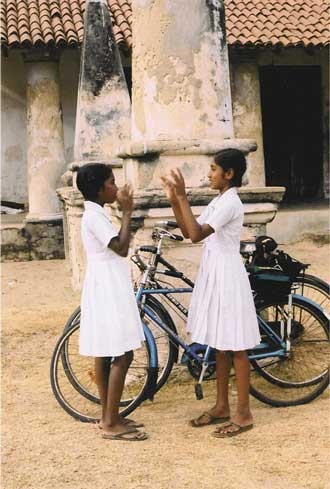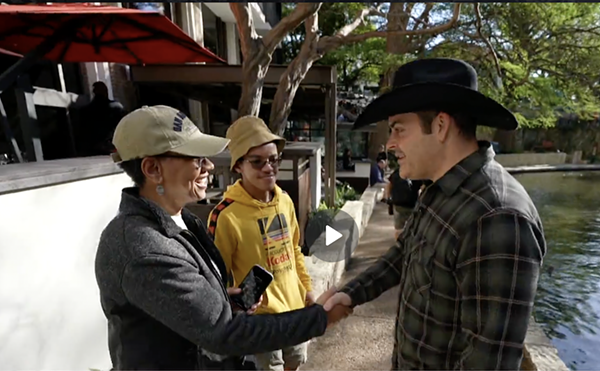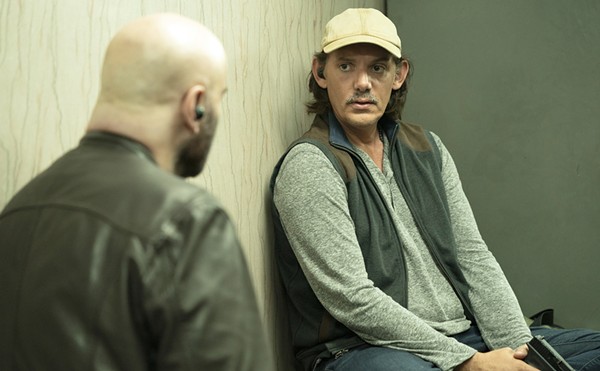P.O.V. goes to Sri Lanka
While most of the world was busy ignoring mayhem in Rwanda, Bosnia, East Timor, Somalia, and Liberia, Sri Lanka was imploding in fierce civil war. Hostilities between government forces and armed revolutionaries and between the majority Sinhalese and the minority Tamils have resulted in more than 65,000 deaths and the displacement of a million Sri Lankans during the past 20 years. A recently brokered peace has been broken several times. Sri Lanka used to be known as Ceylon and, before that, Serendip — the origin of the felicitous word “serendipity.” But there is nothing felicitous about the atrocities committed by all sides in what was once an island paradise.
| Narrated by Sri Lankan native Michael Ondaatje, No More Tears Sister tells the story of one martyr for the cause of peace in this gorgeous but strife-ridden Asian country. |
In No More Tears Sister, director Helene Klodawsky attempts to make sense of Sri Lanka’s brutal postcolonial history by focusing on the short life of one courageous woman, a spunky doctor whose struggle for peace and justice incurred the wrath of armed partisans. The film opens this summer’s edition of P.O.V., PBS’s weekly series of exceptional nonfiction work. With subjects from Peru, Japan, South Africa, Iraq, and Mexico, the offerings during P.O.V.’s 19th season are particularly international. Beginning with Klodawsky’s take on strife in Sri Lanka at 10 p.m. June 27 (repeated at 1:30 a.m. June 29), the series will be broadcast in San Antonio on KLRN-TV every Tuesday evening throughout the summer.
| No More Tears Sister Dir. Helene Klodawsky 2004 |
No More Tears Sister begins on September 21, 1989, when Dr. Rajani Thiranagama is shot dead while bicycling home from work. The film proceeds to trace her evolution as a peace advocate until her assassination at 35. Lacking footage of the woman herself, the film relies heavily on interviews with her older sister, a proud activist named Nirmala, and her husband, Dayapala Thiranagama, the Sinhalese radical she married despite objections from her own Christian Tamil parents. In a few brief reenactments, Rajani is portrayed by her daughter, Sharika. At first, Rajani, committed from an early age to helping her country’s poor, makes common cause with her husband’s struggle against an oppressive Sri Lankan regime. But her cooperation with the Liberation Tigers of Tamil Eelam, a militant separatist group popularly known as the Tamil Tigers, causes a rift between husband and wife, as do imprisonment and the need to go underground. Eventually, Rajani, disillusioned with the ruthlessness of the Tamil Tigers, breaks with them and becomes a martyr for universal human rights. “No more tears sister,” Rajani insists in a letter of encouragement she sends to Nirmala shortly before the end. Yet at the end of No More Tears Sister, Nirmala weeps for Rajani and for everything else that she has had to sacrifice. “I’ve paid too heavy a price,” she says.
“The killing of critics and dissidents goes on unabated,” concludes the narrator, Michael Ondaatje, the novelist who emigrated from Sri Lanka to Canada. “But there will always be those like Rajani who continue to cry out against injustice.” Set against a painfully gorgeous subtropical landscape, No More Tears Sister cries out against the cruel sectarianism that is tearing a nation apart.
















